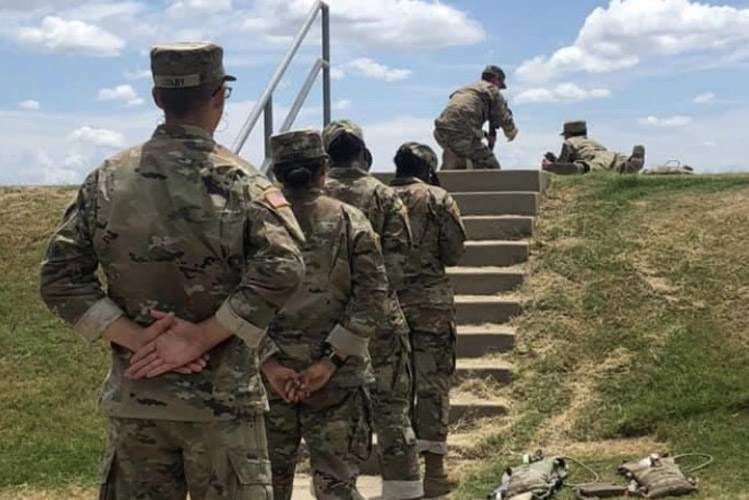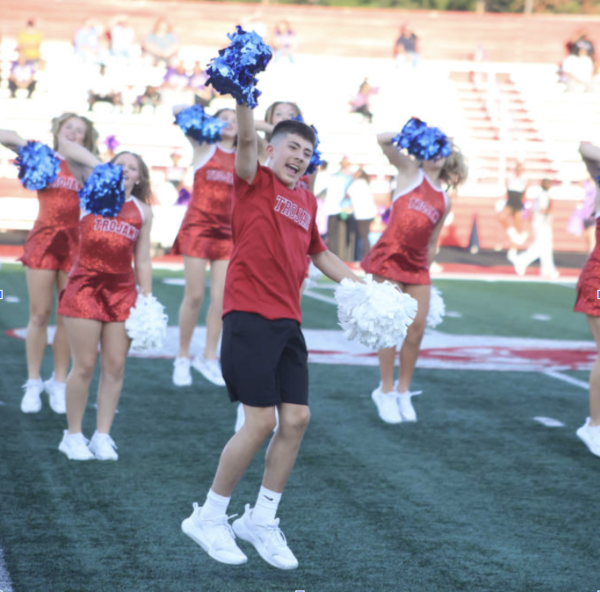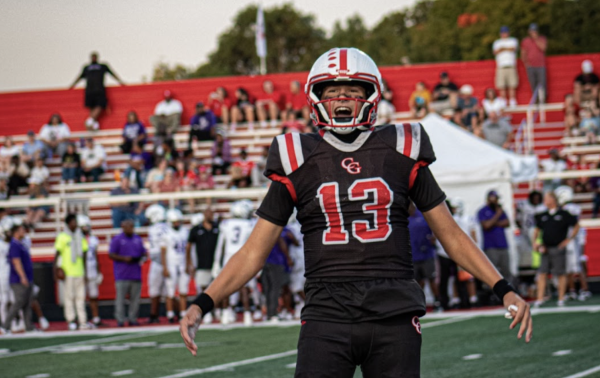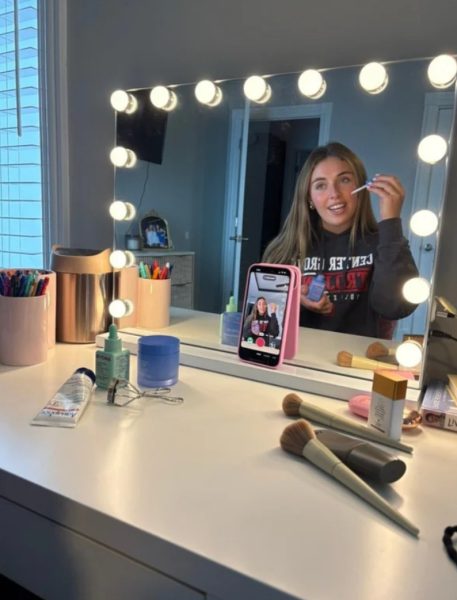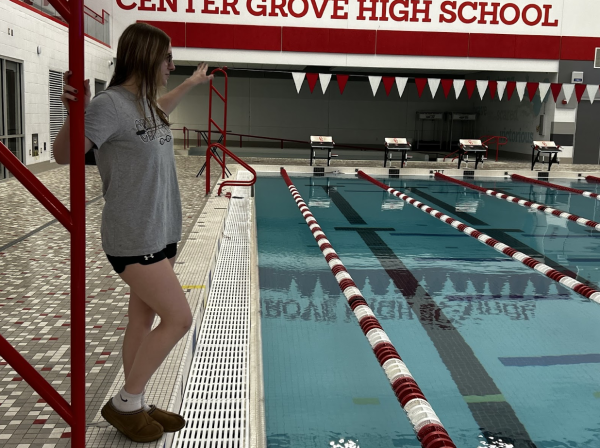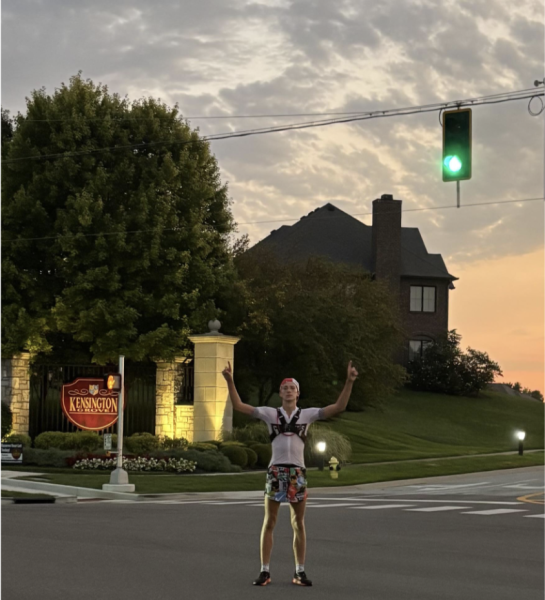Senior Enlists in his Future
David Colby ’21 (left) stands in line waiting in single rank for his moment to participate in a drill.
When most high school students are looking for colleges, jobs and discovering a major, Senior David Colby is starting to take steps to join the United States military. Colby, from a young age, has always wanted to serve in the military and, over the summer of 2020, he got to live out his dream and officially become a soldier.
“I went to Fort Sill, Oklahoma on May 19 and the plan was for a 10 week training period,” Colby said. “Training was broken up into three phases: red, white and blue. The red phase focused on in-class and just starting to get out into the field, white started to work on marksman technique and teamwork in the field, and blue recapped everything you had learned and put you in a week long tactical base mission. These phases break up the learning process so we can effectively learn the rules and train to become service men.”
Drills in the military are essential, as they help provide the proper training and reaction to situations. The drills are designed to push the mind and body to create, not just as an individual, but as a team of newly-formed soldiers.
“They reach out to you early on that you are not an individual, you are a member of a team and you must work with cohesion to perform every task that is given. An example of these circumstances include helping weaker members support their rucksacks during tactical marches,” Colby said. “Some drills were more difficult and proved to be challenging. For example I had broken a shovel that is used to create a hole to sleep in, so I had to use the other resources around me. I had to use branches, sticks, and one occasion I had to use a rock and pound the ground as hard as I could until it was large and deep enough for me to sleep in.”
Despite the obstacles, Colby was expected to help encourage his fellow soldiers in order to keep the morale high. This was to ensure that people stayed motivated throughout training and continued to work hard.
“No one at the end of training has any regrets because you feel as though you had accomplished your goal of being a member of a great and powerful team,” Colby said. “As for leaving or not wanting to be a part of the program, it happens to everyone. Sometimes at first, usually midway through but never at the end.”
At the beginning of training, each cadet was put into a battery, which is a group that works together during the duration of the training and were assigned to help one another in time of need.
“I was put into a group of twelve at the beginning of my training, and we came up with nicknames after day three. We had come up with names for each other such as Blaze, Crab, Hot Cheeto, Punocio and, for myself, CC, standing for Captain Colby. I earned my nickname by leading our first excessive formation and I kept good terms with everyone so they figured it appropriate and so did I,” Colby said. “Most nicknames come from what they do in training, their personality, and hobbies, such as Hot Cheeto, and he got his nickname because he would never stop talking about Hot Cheetos all of training.”
The training was difficult, but Colby found that missing his family proved to be the most challenging obstacle.
“I wrote a total of six letters throughout my training, all at the beginning phases to let everyone know I was fine,” Colby said. “The way I coped with the idea of not seeing my family for an extra month was actually funny. I would always smile and laugh while thinking of my family after a long day of training, which would actually scare a couple of my buddies.”
Cadets were not allowed comfort items, such as phones, jewelry or card games. To Colby, this only added to a never-ending feeling of isolation from both the outside world and his family.
“There was only a single store that I went to called ‘PX’ which I could get hygiene supplies and on rare occasions cleaning supplies, in case there was an upcoming inspection,” Colby said. “Officers would perform inspections which happened about every other week. They would look for contraband, unproductive activities, such as books, board games, and or sports items, and items brought from home,” Colby said. “This was to ensure we were upholding the standard of our equipment.”
During training, Colby transformed from a high school student into a young man ready to fight for the United States. As the end of the final task approached, Colby was ready to officially begin his formal induction to the army.
“No one at the end of training has any regrets because you feel as though you had accomplished your goal of being a member of a great and powerful team. I remember the sorrow in the barracks the last day due to the people that quit on themselves and couldn’t complete the marches; we cried for those who didn’t make it,” Colby said. “Once we got our equipment off and got back to our battery we kissed the concrete and hugged our bunks that we called home. This last task was called ‘The Forge’ . ‘The Forge’ is the final task that I and many others had to complete, which required 40 miles of marching along a path, hand to hand techniques, combat tasks and patrol coverage spanning over 80 hours. Once we completed this task, we were officially United States Soldiers.”
While it wasn’t always easy, Colby kept his long-term goals in mind.
“When I was younger I would always wanted to go to the veterans breakfast, so I always imagined being able to go with my sibling as soon as I came home. My other reason was my girlfriend of two years. Honestly, when I would have a bad day of training, I always thought of her and couldn’t wait to see her again,” Colby said. “Coming back from training was an experience, but I struggled the hardest that day to hold back tears after seeing everyone’s
faces. I will never forget seeing my girlfriend’s face for as long as I live. It truly took my breath away seeing her and my family all surprise me.”
The training’s routines still plague Colby as he adjusts back to civilian life. However, he still is looking forward to his next steps in the military.
“After leaving training I have a bad habit of calling everyone “sir” or “ma’am” due to the most important part of training being to treat everyone with respect,” Colby said. “I learned how to respect and really cherish things in life more than I already did. I enjoy life far more after leaving basic training and can’t wait to go back to Advanced Training and see what the future holds.”
Your donation will support the student journalists of Center Grove High School. Your contribution will allow us to purchase equipment and cover our annual website hosting costs.


